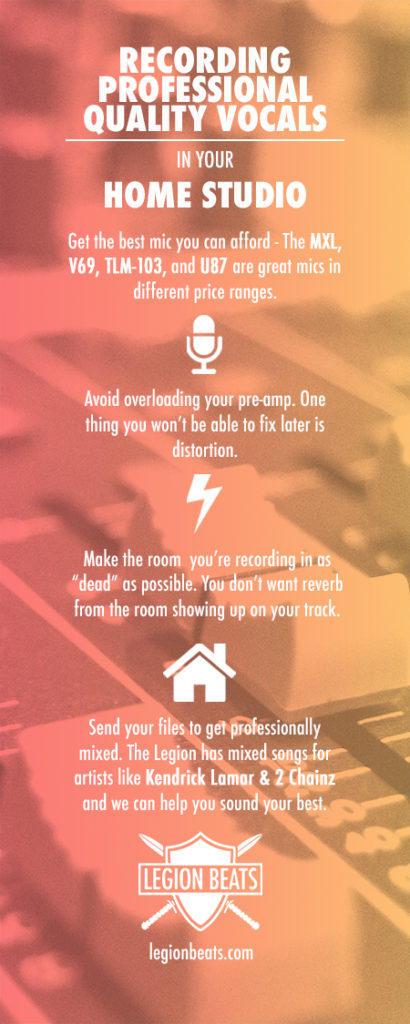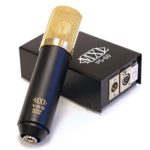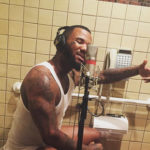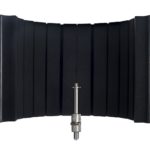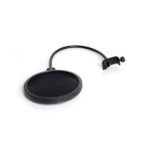As a vocalist, you want to record your vocals with the highest quality possible.
Ideally you’ll be recording in a million dollar studio with top-of-the-line equipment, high-end room treatment, and a professional engineer that has spent years honing their craft.
BUT…this is not always possible, so I want to give you a few tips that will help improve the sound of your vocals if you’re recording at home.
1. Get the best mic you can afford to record with
The MXL V69, TLM-103 and U-87 are examples of great sounding mics for different budgets.
Picking the right mic is one of the keys to making your home recordings sound professional. Any of those 3 are great choices.
2. Avoid overloading your pre-amp
One thing you won’t be able to fix later is distortion. Make sure you’re not “going into the red” and you should be fine. Speaking of pre-amps, we use the Apollo Twin and highly recommend it as an interface and pre-amp all in one.
3. Make the room you’re recording in is as “dead” as possible
You don’t want reverb from the room showing up on your track. This is one tip that separates professional quality rap and singing vocals from amateur home recordings.
Don't record in your bathroom!
Instead of the bathroom, you'll be much better off in a closet with a bunch of clothes surrounding you. You can use something like this to help absorb some reflections:
You want to avoid hard surfaces and corners in your recording space. Try putting blankets on the walls, carpets on the ground and fill in corners and walls with foam. Clothes and couches absorb sound too. Be creative!
4. Use a pop filter
Those are the big hoops with mesh stretched across them that you see in front of mics in professional studios. This helps prevent the “plosives” which are the popping sounds you hear when a vocalist sings words with the letters “p” or “b.” Click here to check one out.
5. Mix your vocals
Mixing is an art form that takes a lifetime to master but there’s a few basic effects you’ll want to use if you’re mixing for yourself. You’ll want to use a compressor to even out volumes and add presence, EQ to cut annoying frequencies and boost others, and a de-esser to minimize hissing tones. This is really just scratching the surface of mixing, but it’s a good place to start!
The #1 thing you can do to make your songs sound radio ready, no matter where they were recorded, is to have them mixed by a professional.
The Legion has mixed songs for artists like Kendrick Lamar, Wiz Khalifa, Tech N9ne and lot more, so we can get you sounding right!
Shoot us an email at [email protected] if you'd like us to mix & master your next song.
I've heard too many songs that had potential to be successful, but never were because of amateur mixing and mastering. Let us help you to not make that mistake.
If you have any questions about recording, mixing or anything else, please let me know.
-Gabe of The Legion
Please note that some of the links on this page may be “affiliate” links, meaning if you click on them and buy, we could receive some compensation (at no extra cost to you). But I'll always only recommend products that I use myself and recommend to friends.
![LB 2020 LOGO [ASSETS] – b logo + b text only](https://legionbeats.com/wp-content/uploads/2016/08/LB-2020-LOGO-ASSETS-b-logo-b-text-only-1-300x78.png)

